Woman Laughs At Her Neighbour's Face After She Told Her She Will Get Her Guard Dogs Removed Because They Cornered Her Kid
There are various reasons to want a guard dog, including personal safety, property security, and use as a living doorbell for guests. Unfortunately, guard dogs frequently receive a bad reputation for being aggressive or dangerous, but that's not entirely true.
In actuality, the qualities that make these breeds the best guardians also make them fantastic family pets. These qualities include fierce loyalty to the humans they've adopted as their "pack," intelligence that allows them to be trained to react to real threats, and a loving streak a mile wide.
The best guard dogs are loyal, courageous, and aware of when to repel an invader, but they aren't always vicious animals. The OP in today's post has four guard dogs (Middle Asian and Caucasian Shepherds) that roam freely on the property at night or when there aren't many owners around.
The OP's family actually runs an equine center that is not very large and is mainly for private clients. It stables 18 horses, most of which are quite expensive, so the house, the yard, the fields, and the arena are all on the same fenced territory.
The neighbor's kids developed a habit of climbing over the fence to look at the horses, even after being warned. One day, they were cornered by the guard dogs, and the police had to get involved.
Read the full story for yourself as you keep scrolling below.
The Headline

The OP runs an equine center stabling 18 horses

We only provide services to the people who stable their horses at our place
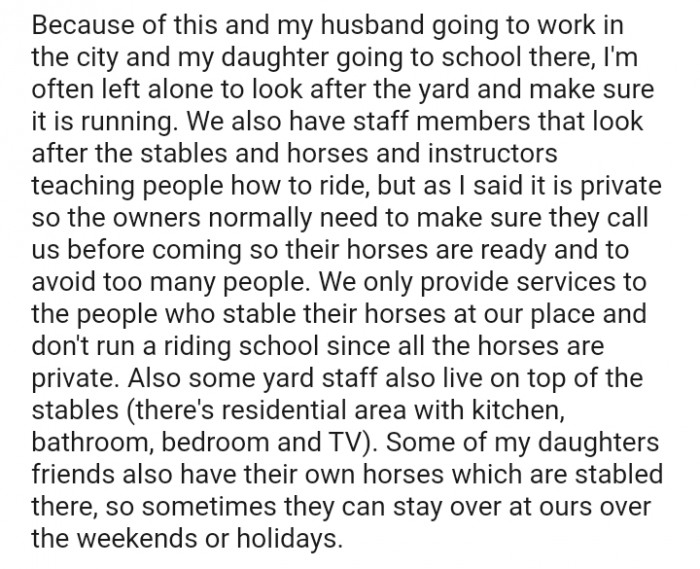
The Role of Guard Dogs in Neighborhood Safety
Guard dogs can be a contentious issue in residential areas, particularly when their behavior impacts the safety and comfort of children. According to animal behavior experts, dogs are instinctively protective and can perceive threats in their environment, which may lead to behaviors perceived as aggressive. Dr. John A. McDaniel, a canine behaviorist, notes that understanding a dog’s protective instincts is essential for fostering a harmonious neighborhood.
Studies show that proper training and socialization can significantly reduce aggressive tendencies in guard dogs, leading to safer interactions with children and other residents. It’s crucial for dog owners to recognize their pets' triggers and provide appropriate training to ensure they can coexist peacefully with neighbors.
Understanding Protective Behaviors
Dr. Maya Simmons, a behavioral psychologist at Columbia University, emphasizes that protective behaviors, like guarding one's property, are often driven by instinctual fears.
Her research indicates that such reactions can stem from past experiences of threat or loss, influencing how individuals respond to perceived dangers.
This situation highlights the emotional undercurrents that can motivate seemingly aggressive actions.
They are guard dogs, so they are ready to protect the property
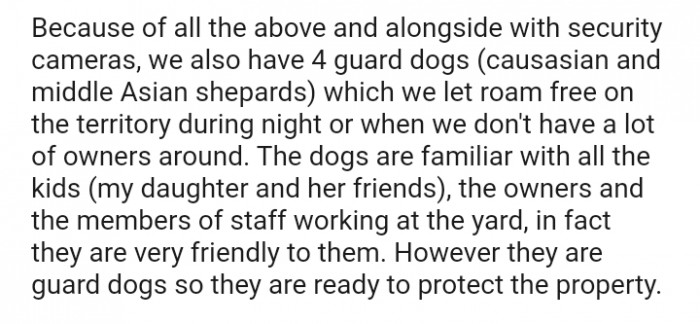
The OP laughed and reminded her they have been warned multiple times

In just a day of being posted, the Reddit thread received 5.5K upvotes along with hundreds of comments. Here are some of the topmost replies below.
She can't act like a clown and not be laughed at

When conflicts arise between neighbors over pet behavior, effective communication can help address concerns without escalating tensions. Engaging in open discussions about each other's perspectives can foster understanding and lead to mutually beneficial solutions. Research from the Journal of Social Psychology emphasizes the importance of conflict resolution techniques in improving neighborhood relations.
Additionally, neighborhood watch programs that focus on collaboration between residents and pet owners can create safer environments while addressing the concerns of all parties involved.
This scenario reflects the psychological concept of territoriality, which can evoke strong emotional responses when individuals feel their space is being encroached upon. According to Dr. Michele Gelfand, a cultural psychologist, "Territorial behaviors often arise from a deep-rooted need for safety and control, particularly in shared environments." Research in the field emphasizes that such behaviors can escalate tensions in communal living situations. Understanding these dynamics can help individuals approach conflicts with greater empathy, as noted by Dr. Sue Johnson, who states, "Empathy is key in resolving conflicts and fostering harmonious relationships."
He's lucky the dog didn't attack him

Trying to be near animals that aren't used to them

She is misplacing her anger
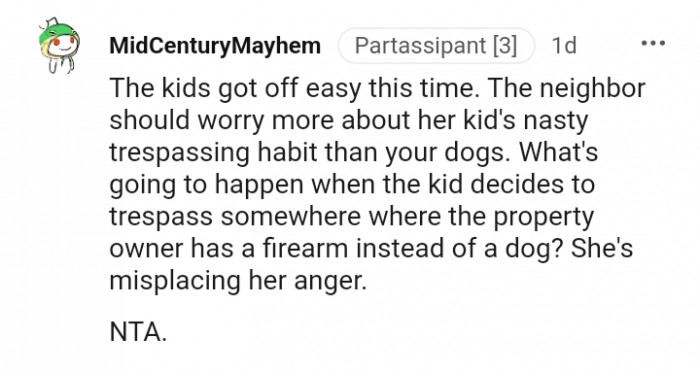
Understanding Fear Responses in Children
Children’s fear responses to dogs, especially guard dogs, can stem from a lack of familiarity or negative past experiences. Developmental psychology research indicates that children often develop fears based on their interactions with animals and the reactions of adults around them. Dr. Alice Miller, a child psychologist, highlights the importance of guiding children’s experiences with pets to foster positive associations.
Providing education about dog behavior and safe interactions can empower children and mitigate their fears. Studies suggest that involving children in supervised interactions with well-behaved dogs can help them develop confidence and reduce anxiety.
The Impact of Fear on Social Interactions
Fear can significantly influence how individuals perceive threats in their environment, often leading to heightened defensiveness.
Research from Stanford University shows that when individuals feel threatened, their capacity for rational thought can diminish, leading to impulsive behaviors.
Recognizing this pattern can empower individuals to respond more thoughtfully in tense situations.
Doesn't seem particularly unreasonable to me
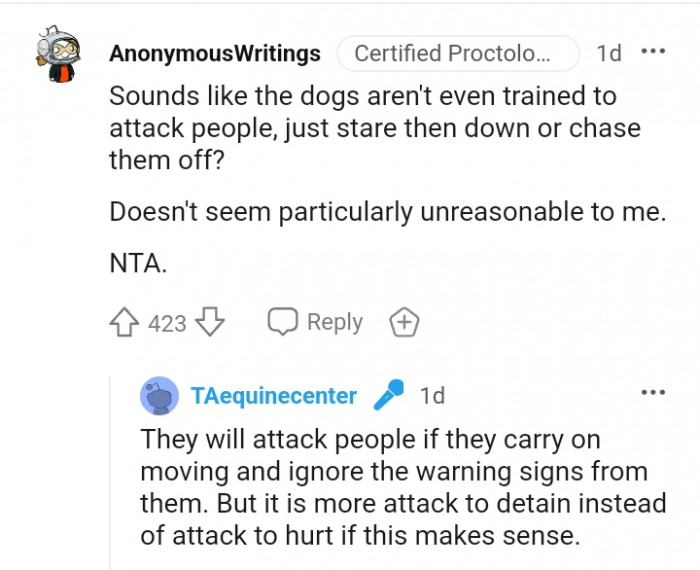
The neighbors are lucky your dogs are well trained
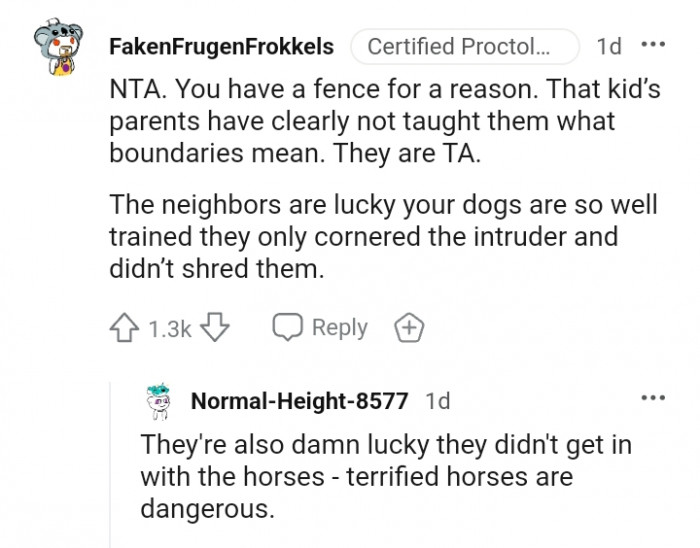
They were clearly trespassing

Understanding the emotional triggers behind protective behaviors is crucial for managing conflicts effectively.
Studies show that recognizing these triggers can help individuals engage in more constructive dialogue and reduce defensiveness.
Implementing mindfulness practices can enhance emotional regulation, allowing for calmer responses in stressful situations.
This Redditor would contact a lawyer as soon as possible

The OP says the laugh was not intentional
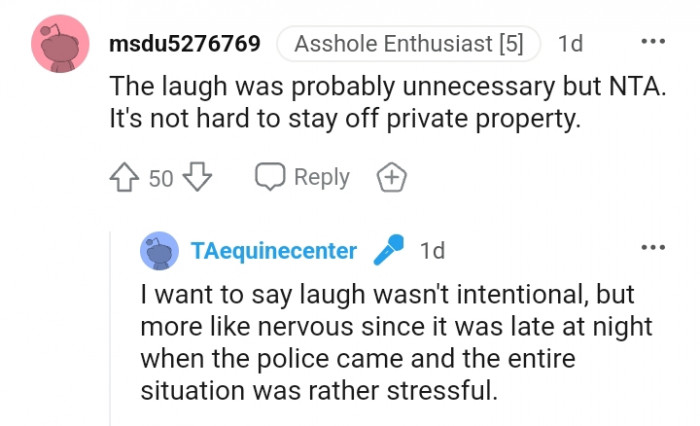
You might want to consider pressing charges
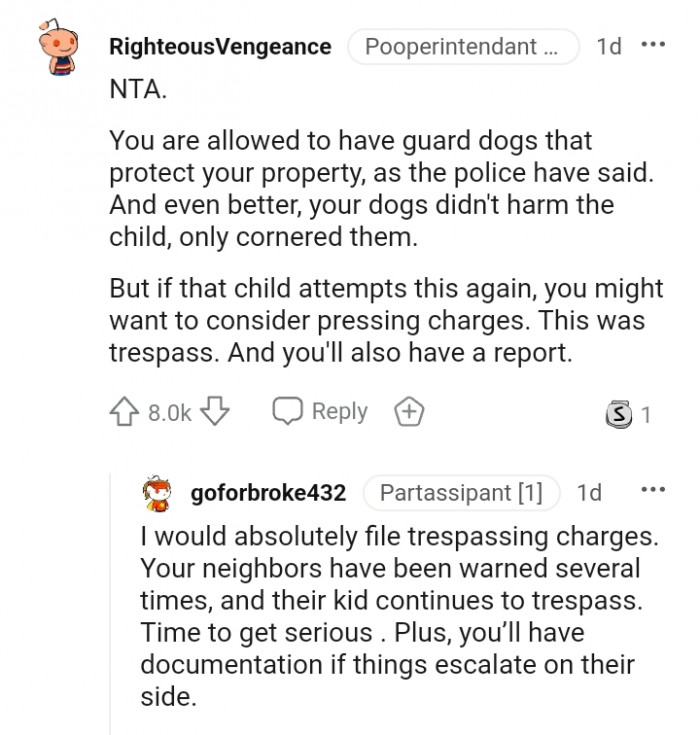
Creating a Sense of Community
Fostering a sense of community can help mitigate the fears that drive exclusionary behaviors.
Research from the University of Michigan indicates that feeling connected to one's neighbors can enhance overall well-being and reduce anxiety.
Encouraging community-building activities can create a more inclusive environment where individuals feel safe and valued.
Pressing trespassing charges or making a formal complaint

The kid could have been seriously hurt

It's the parents' fault as people are too entitled
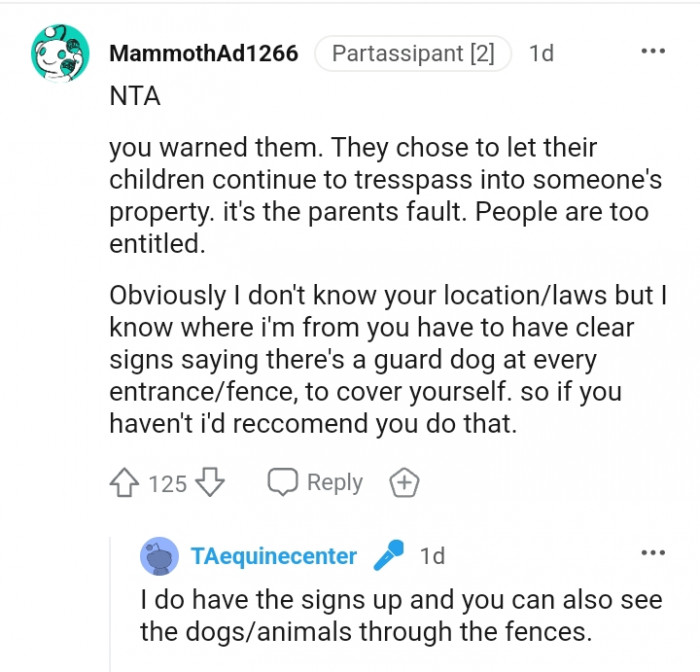
To navigate these complex dynamics, fostering open communication about feelings and concerns can promote understanding and collaboration.
Research suggests that having discussions about personal experiences can enhance empathy and reduce defensiveness.
Creating an environment where individuals feel heard can lead to healthier interactions.
What will bring them in line real quick

The mom should teach her children that no means no
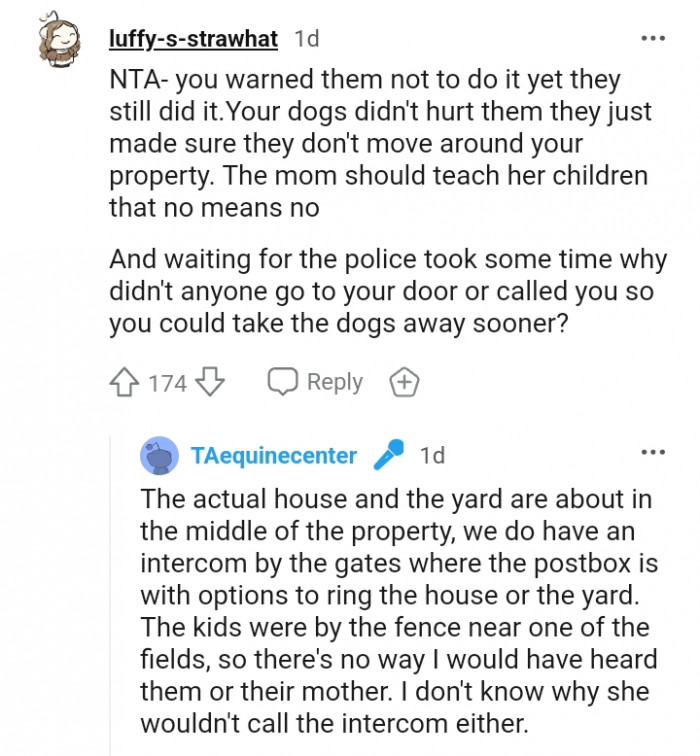
Just document everything moving forward
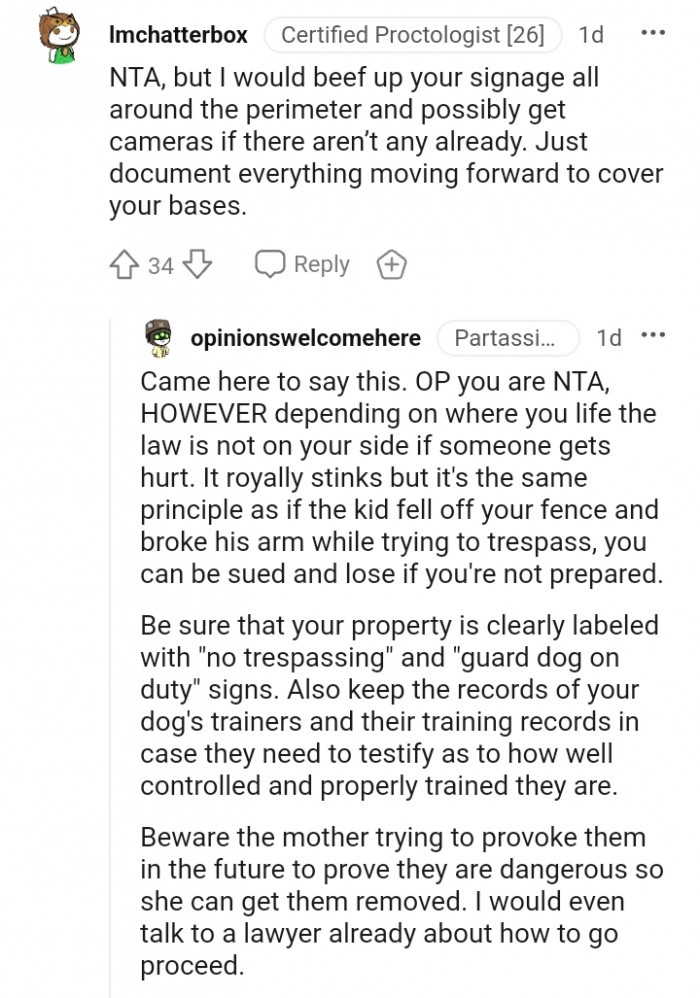
The Role of Emotional Awareness
Emotional awareness is crucial for understanding how personal feelings influence behavior in social situations.
A study from Yale University highlights how increased emotional awareness can lead to more effective communication and conflict resolution.
Recognizing one's emotional responses can empower individuals to navigate social dynamics with greater clarity and compassion.
There are expensive animals on my property
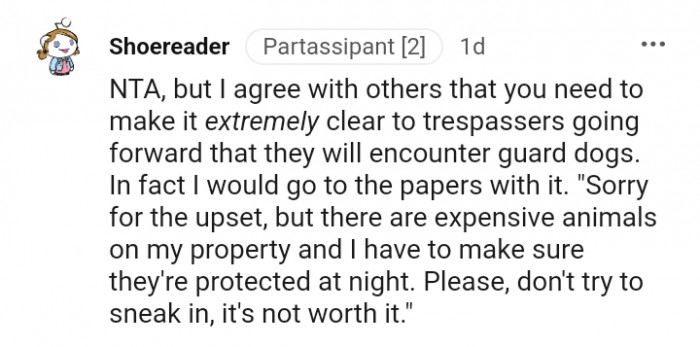
The OP hasn't pressed trespassing charges yet
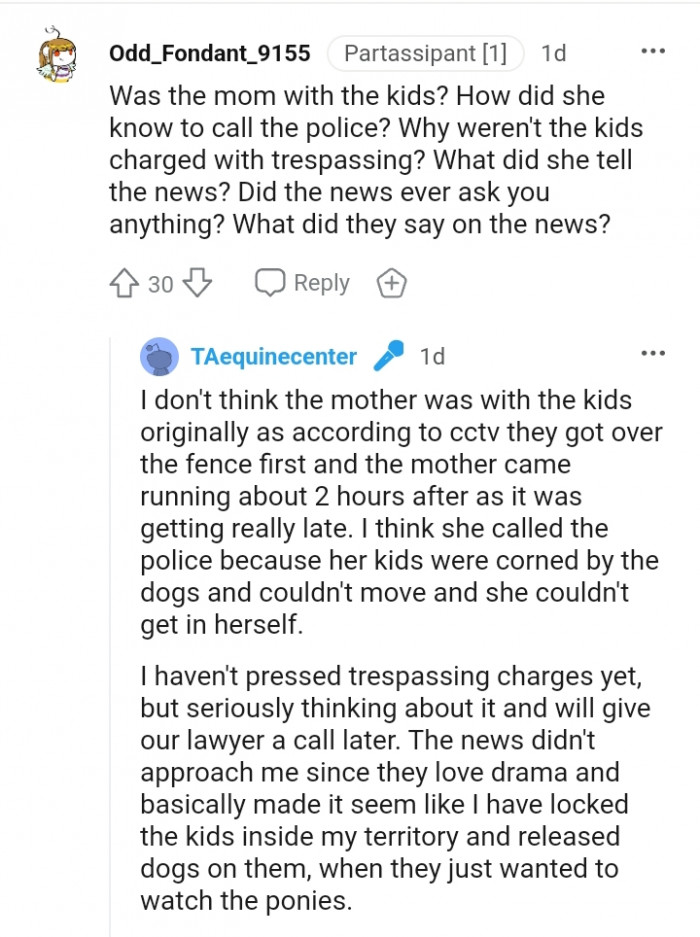
Having them cited for trespassing

Engaging in community dialogues can enhance feelings of safety and belonging, reducing the impulse to exclude others.
Research indicates that fostering connections within diverse groups can create a more inclusive environment.
Encouraging collaborative efforts can help mitigate fears and promote healthier social dynamics.
You take out a cease and desist

A security dog will be ready to shower you with love and affection for the rest of your life, just like any other working dog is when they're not on duty. These dogs will go above and beyond to keep you safe if you give them the training they require when they are young.
Yes, the OP's guard dogs are friendly, but the neighbor's kids should be taught boundaries.
Psychological Analysis
This situation highlights the complex interplay between fear and community dynamics. It's important for individuals to recognize their triggers and engage in open dialogue to foster understanding and collaboration.
Encouraging inclusive practices can help mitigate fears and promote healthier community dynamics.
Analysis generated by AI
Analysis & Alternative Approaches
Navigating protective behaviors and community dynamics can be challenging. When individuals approach these situations with empathy and open communication, they can foster healthier interactions and reduce conflict.
Recognizing emotional triggers, setting boundaries, and encouraging community engagement are essential strategies for creating a sense of safety and belonging.
Analysis & Alternative Approaches
In conclusion, addressing concerns about guard dogs requires a balanced understanding of both animal behavior and community dynamics. Promoting awareness and education about dogs' protective instincts can help foster safer interactions. By encouraging open dialogue and collaboration among neighbors, we can create safer environments for everyone.



